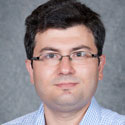Machine Learning-Based Automated Detection of Seafloor Gas Seeps
Meet the Explorers

Adam Skarke
Principal Investigator, Mississippi State University
Adam Skarke is a geologist with broad research interests in the fields of marine geology and geophysics. His research is focused on understanding fundamental physical relationships between sediment transport, morphological expression, stratigraphy, and subsurface fluid flow in seafloor environments that span the continental margin from coastal waters to the deep sea. His technical approach is field based and focused on the analysis of geological, geophysical, and oceanographic data collected with innovative environmental observing sensors and platforms. He has conducted extensive research on seafloor gas seep systems focused on their detection, characterization, subsurface fluid transport processes, and geologic context. He is an associate professor of geology in the Department of Geosciences at Mississippi State University and a registered professional geologist. Prior to his current appointment, he was a scientist with NOAA Ocean Exploration.

Ali C. Gurbuz
Co-Principal Investigator, Mississippi State University
Ali C. Gurbuz received his bachelor’s degree from Bilkent University, Ankara, Turkey, in 2003, in electrical engineering, and master’s and doctoral degrees from Georgia Institute of Technology (Georgia Tech) in 2005 and 2008, both in electrical and computer engineering. From 2003 to 2009, he researched compressive sensing-based computational imaging problems at Georgia Tech. Between 2009 and 2017, he held faculty positions at TOBB University, Ankara, Turkey, and University of Alabama, where he pursued an active research program on the development of sparse signal representations, compressive sensing theory and applications, radar and sensor array signal processing, and machine learning. Currently, he is an assistant professor at Mississippi State University in the Department of Electrical and Computer Engineering, where he is co-director of the Information Processing and Sensing (IMPRESS) Laboratory. Ali was the recipient of the Best Paper Award from Signal Processing in 2013, the Turkish Academy of Sciences Best Young Scholar Award in Electrical Engineering in 2014, and a National Science Foundation CAREER award in 2021.

Surabhi Gupta
Undergraduate Researcher, Mississippi State University
Surabhi Gupta is an undergraduate senior majoring in wildlife, fisheries, and aquaculture science with minors in biology and environment and sustainability. Her research experiences span over geosciences, plant sciences, wood science, and landscape ecology. Her primary interests are in computational and quantitative ecology. She plans to pursue a doctoral degree in these areas upon completion of her bachelor's degree.

Ramon Kalski
Doctoral Student, Mississippi State University
Ramon Kalski is a passionate geologist specializing in marine geology. He earned his bachelor’s degree in environmental geoscience from Mississippi State University (MSU) in 2020. He furthered his academic journey by obtaining a master’s degree in geology from the University of Alabama in 2023. During his master’s program, Ramon delved into the analysis of magnetic field data sourced from the MErcury Surface, Space ENvironment, GEochemistry, and Ranging (MESSENGER) spacecraft. His research aimed to discern the depth to the source material of the crustal magnetic field. Ramon is currently pursuing a doctoral degree in earth and atmospheric sciences at MSU. His research is multifaceted, aiming to elucidate the intricate relationship between marine geology and geophysical practices. Furthermore, he is dedicated to exploring innovative data processing methodologies to extract meaningful insights from complex geological datasets.

Sultan Mohammad Manjur
Doctoral Student, Mississippi State University
Sultan Mohammad Manjur received his bachelor’s degree in electrical and electronic engineering from Bangladesh University of Engineering and Technology, Dhaka, Bangladesh, in 2019 and his master’s degree in biomedical engineering from University of Connecticut in 2023. His graduate research was focused on processing electroretinogram signals and machine learning to detect neurodevelopmental conditions. He has published several peer-reviewed articles in reputed conferences and journals. He is currently working toward a doctoral degree in electrical and computer engineering at Mississippi State University. He is working as a graduate research assistant at the Information Processing and Sensing (IMPRESS) Laboratory. His research focus includes signal processing and machine learning for remote sensing applications.

Volkan Senyurek
Assistant Research Professor, Mississippi State University
Volkan Senyurek, received his bachelor’s, master’s, and doctoral degrees in electronics and communication engineering from Marmara University, Istanbul, Turkey, in 2003, 2007, and 2013, respectively. Until 2015, he was an assistant professor at Marmara University. From 2015 to 2017, he was a postdoctoral researcher with the Department of Mechanical and Materials Engineering at Florida International University. From 2017 to 2019, he was a postdoctoral researcher with the Department of Electrical and Computer Engineering, University of Alabama. He is currently an assistant research professor with the Geosystems Research Institute at Mississippi State University. His research interests include remote sensing, biomedical signal processing, wearable sensors, pattern recognition, fiber optic sensors, and structural health monitoring.